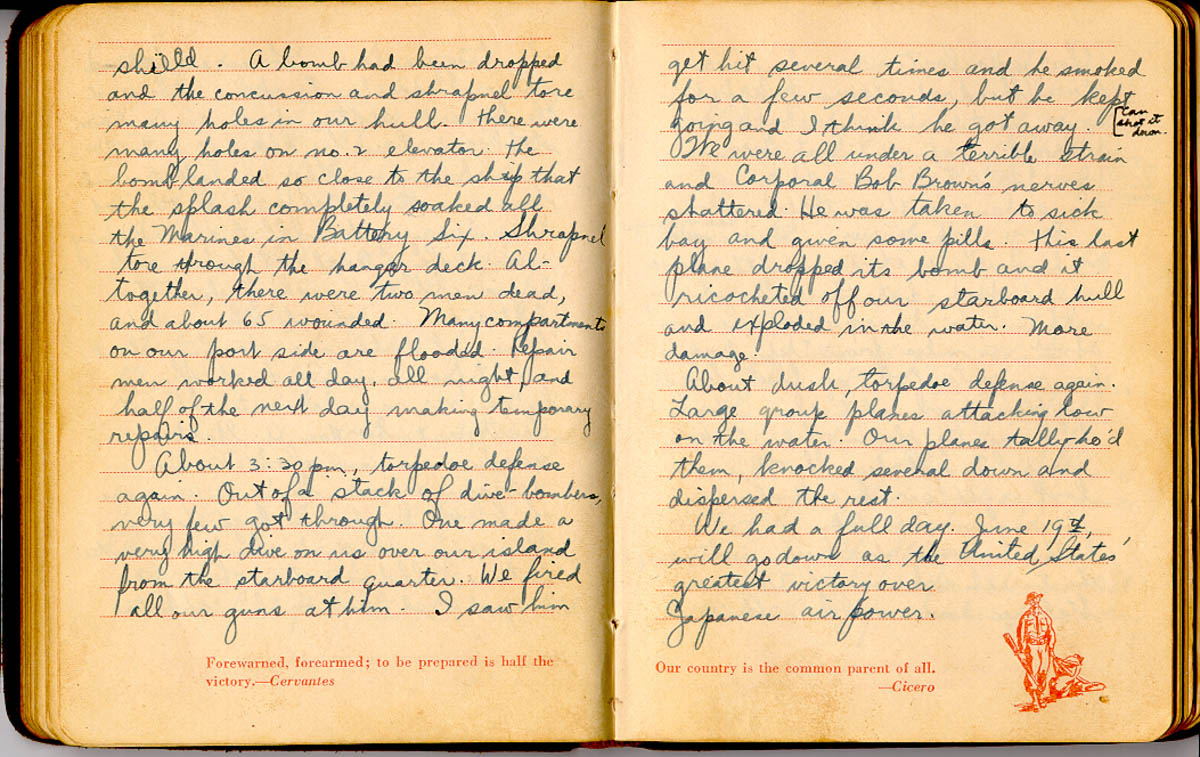Meet the PMML Staff - James Brundage
Have you ever wondered who's behind the scenes making the PMML run smoothly? It’s our pleasure to pull back the curtain and introduce you to the staff you see during your visits and those that work behind the scenes. This month, we are introducing you to James Brundage, the Museum Curator. James began working at the PMML in March of 2019 and works tirelessly to put together thought-provoking exhibits highlighting the stories of the citizen soldier.
PMML: Hi James! Thanks for taking the time to chat with us today, I know there's a lot going on in the Exhibits department. As the Museum Curator, you have the opportunity to closely examine a lot of the items in our collection. Have any of these items made a deep impression on you?
James: I'd have to say, that the collection item that stands out to me the most would have to be Samuel Gevirtz’s diary. Private First Class Gevirtz was attached to USS Bunker Hill as a marine gunner during WWII and kept a detailed account aboard ship from March 1944 until the ship was heavily damaged off the coast of Okinawa in May 1945. We featured the diary during the Allied Race to Victory exhibit in 2020, and it stands out to me as an incredibly intimate look at not only life aboard ship during the war, but also the toll that the Japanese took on the US fleet. Gevirtz describes in detail the Battle of the Philippine Sea and actions throughout the Pacific, to include the toll inflicted on Bunker Hill by Japanese kamikazes during the Okinawa campaign. 
PMML: Wow! The PMML collection has a lot of unique items that share really intimate insights at well-known moments in history. Does that provide a source of inspiration for the work you do as a curator?
James: Absolutely! To be able to explore a variety of individual perspectives and present those experiences to the public through our exhibitions is why I love doing what I do. There is so much to explore in the field of military history, and most individual perspectives are untold or unknown. Using the museum collections, I get to pull these mostly unknown stories into the larger known historical events and present those individuals and their contribution alongside – and as a part of – that more well-known history. It is extremely rewarding to be able to give these servicemen and women the recognition they deserve for their service to the country.
PMML: The team at the PMML is so passionate about the work that they do. That is becoming clearer as we have these conversations. What sparked your interest in military history?
James: I’ve always had an interest in history, but I became interested in exploring military history during and after my own service in the Marines. I recognized at the time that the actions of my battalion, and all those serving, were shaping history, and that someday there would likely be someone researching and trying to better understand the significance of our actions. So, when I left active duty to pursue an education, I knew that I wanted to study history. I became involved with military history through volunteer opportunities I pursued at the Connecticut Historical Society. Because of my military background, the staff decided to have me work with their military collections, and that for me was really my entry into working with military history in a concrete way.
PMML: To have such a unique perspective on history as it's happening is really interesting. Your personal and professional experiences, as well as your educational background, have provided you with a deep knowledge of well-known and lesser-known participants in historical events, if you could have lunch with someone from history who would it be and why?
James: Ah! This is a tough question. There are definitely a few good options, but I think I’d want to talk with Captain William Bainbridge. I have a great interest in early American Naval history and Bainbridge stands out for having been involved with many of the most famous events of the period, and as having contributed greatly to the early navy’s formation. I think it would be such an interesting experience to be able to discuss some of these events including the grounding of USS Philadelphia off the coast of Tripoli, with a man whose career was highly influential to the U.S. Navy during and after his lifetime.
PMML: Well James, I think I'm out of hard-hitting questions. But I do have one last one. Fall is right around the corner. Is there anything in particular you're looking forward to?
James: I enjoy the cool weather and going apple picking with my family. My first job was working at an apple orchard, and nothing is more enjoyable than getting to do something I love with my kids.
